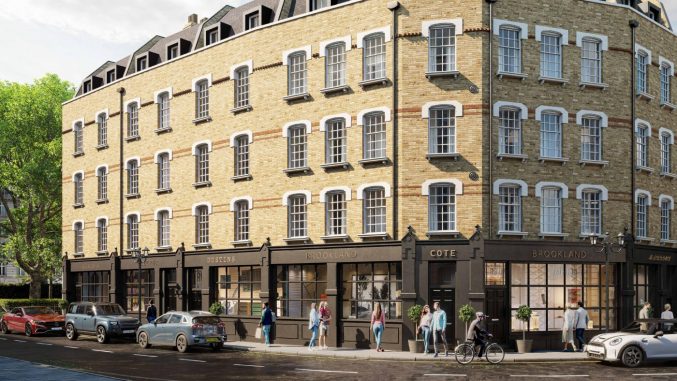Why Covid changed how women buy, invest and work in property
By Laura Miller

Women’s wealth has been unequally hit by the effects of coronavirus in ways that may impact their finances from everything to getting a mortgage to saving for retirement for decades to come – moves to rectify that could also have far reaching consequences for property.
More than 70% of women are feeling less financially secure due to Covid-19, according to the WealthiHER Network and financial advice firm Tilney. Data released this month by the Office for National Statistics upheld previous pandemic findings as to why; on average women have faced greater disruption to their ability to earn, and so to save and stay out of problem debt.
Unequal sharing of extra caring duties are partly to blame. In September/October last year, women were doing 99% more unpaid childcare than men, the ONS found. At the same time, women also did 64% more household chores (by October men did 5 minutes a day less than pre-pandemic), and were bearing the brunt of homeschooling.
Roxana Mohammadian-Molina, chief strategy officer at Blend Network, recalled taking on more at home in the first lockdown: “I had help before the pandemic and suddenly I had to start doing things I didn’t even know how to do such as ironing, which I must say I quite enjoy now.” Like many families, Tiba Raja, executive director of Market Financial Solutions, found her two older sons descended on her last Spring. “That was certainly extra hard work. It’s amazing how quickly they get used to Mum doing everything for them again,” she said.
Mohammadian-Molina and Raja were able to continue working, but many women were not. Men were more likely to be furloughed at the pandemic’s outset, but summer holidays, a disturbed school term and then lockdown 3 led to more women, who are likely to be the family’s lower wage earner, requesting to stay on furlough for childcare. Sectors where women are overrepresented like retail and hospitality have been shut more and for longer. From July 2020 more women remained on reduced furlough wages (figures from January 2021 suggest this is equalling out).
“All this will have far-reaching financial consequences for women,” said Sarah Coles, personal finance analyst at Hargreaves Lansdown. Financial penalties triggered by mothers’ career breaks in the early years will be exacerbated by another year out, she said. “And when more caring responsibilities come later in life, for parents or grandchildren, women could be earning even less than their partner, so might be in the frame for this too,” Coles added.
For the mortgage sector this means more women facing more problems borrowing to buy or invest in property due to reduced earnings and gaps in employment, as well as an increased likelihood of problem debt that makes securing borrowing difficult; according to debt charity StepChange, 30% of those reporting being financially worse off because of Covid were women, compared with 26% of men, with the young and those in insecure work most likely to have lost out. Already pre-pandemic one in five women scored as ‘financially bad’ with regard to property and mortgages in terms of the affordability of their current housing circumstances, according to research by wealth manager Close Brothers, the corresponding figure among men was just one in 10.
Problems are likely to be particularly acute for the self-employed, who lenders already view as extra risky. Research by IPSE, the freelancers’ trade body, found over half of all freelancers (59%) feel they are penalised for being self-employed when trying to get a mortgage. For self-employed women this problem is being made worse by Covid. On top of the greater female pay gap among freelancers (43% versus 17% among employees), IPSE found during the pandemic female freelancers have also had greater financial problems. Almost half (49%) experienced late payments before the pandemic (compared to 40% of men), while two out of five (40%) women had done since the pandemic – compared to 23% of men.
Chloé Jepps, head of research at IPSE, said: “Women are more likely to be unable to pay basic business and living costs and more of them are also having to borrow from family and friends and sell items they own as a result. It is clear that although more women have clung on in self-employment, of those freelancers who remain the financial strain of the pandemic is hitting women harder.”
Women were already three steps behind men financially going into the pandemic; they held £17,000 less in investable assets, according to Financial Conduct Authority data, which also showed they expected £8,460 less a year in retirement (and were only half as sure they would ever be able to retire). Coronavirus is now setting the clock back further. “People have been forced to sacrifice tomorrow to survive today and that can take years to unwind,” Becky O’Connor, head of pensions and savings at Interactive Investor, said. “Even once lockdowns have eased and life returns to something like normal, millions of households will continue to pay the price of the pandemic for years in higher debt, lower savings and smaller pensions.”
Calls are growing for the unequal hit to women’s finances not to be overlooked in the rush to reopen the country from the latest lockdown, potentially with a material impact on the development sector (currently on track to be a ‘build back better’ winner). MPs on the Women and Equalities committee want the government to officially acknowledge the greater financial effects of coronavirus on women, and address their present and future financial risks by redesigning the Industrial Strategy, New Deal, and Britain’s post-Covid economic recovery plan, currently “heavily skewed towards male dominated sectors” like construction. A ‘care-led economic recovery’ that backs the child and social care sector would create 2.7 times as many jobs as would the same investment in construction, and 50% more in direct and indirect tax revenue, according to the Equalities committee report.
Women are also being encouraged to foreground their own finances in the Covid recovery, including by moving away from a disproportionately risk-averse stance with their savings in order to achieve higher returns (women hold 55% of Cash ISAs earning virtually nothing). Some have suggested the property sector could have a role to play in rebuilding, and future-proofing, female finances. The Bank of England has estimated wealthier households have saved an extra £100bn due to lockdown restrictions on work and travel, and with interest rates on government bonds and cash at record lows, investing in property could look an attractive alternative for traditionally more cautious female investors.
It is a pathway to wealth Mohammadian-Molina backs, after seeing the dangers of having all your financial eggs in one basket during the first lockdown. She said: “One lesson that applied to many people around me is the importance of having more than one source of income. We have seen many people losing their jobs and livelihoods or having to take salary cuts. This has really highlighted how important it is to have multiple sources of income, for example from various investments or rents. My advice to anyone would be: invest to create a second (or third or fourth) source of income.”
Policies to rectify women’s Covid-related financial hit could have wider implications for the bridging and property sector, in terms of employment practices. The government said this month it is “in the interest of employers and employees to make offers of flexible working standard”, and the Minister for Women and Equalities called for flexible working to be “normalised”, a move that especially helps those trying to juggle childcare. It is expected to be hotly debated once non-essential workplaces begin reopening in the coming weeks.
During the first lockdown, Raja was keen to get everyone back in the office: “I think there are elements of finance that lend themselves to working from home, however at MFS we place huge importance on the interaction between teams, and internal communication. I think that is difficult to do efficiently from home”, she said. Mohammadian-Molina was also a staunch supporter of the return to the office: “I believe human interaction is key, nothing can compare to grabbing that coffee with someone and simply being able to interact with another human being. Also I think after a while if a company has all or part of its team working from home, it will run the risk of its employees feeling detached and unmotivated”.
Research published by the Government-backed Behavioural Insights Team (BIT) and jobs website Indeed in March found offering flexible working explicitly in job ads would increase applications by up to 30%. Analysing nearly 20 million applications, it found greater transparency in job adverts would create at least 174,000 flexible jobs for the UK economy per year. Louisa Sedgwick, managing director of mortgages at Vida Homeloans, was more sanguine about the work from home revolution during the initial lockdown: “I think it typically works really well in most areas of finance, albeit in customer facing roles there may still be a need for flexibility. The pandemic has given us new choices, showing us we can adapt to different ways of working. Typically women will be predominantly responsible for childcare, through either choice or necessity, so home working does lend itself to greater flexibility. However, I don’t think this is simply an opportunity for change for the greater good of women, but for the wider working community.”
The wider working community seems to agree: almost 40% of employees worked from home in 2020, according to the Indeed research, with 9 out of 10 jobseekers saying they wanted increased flexibility, be it remote working (60%), flexitime (54%) or reduced hours (26%) in future. Baroness Ros Altmann, a former pension, said now was time to back policies like flexible working to help women in particular regain their wealth. “It is vital measures are put in place to help women rebuild their financial position as we recover from the past year of lockdowns and illness,” she said. “Policymakers, businesses, and families or individual women need to be prioritising the needs of women, who are so often the poor relations in pensions or finance.”

Laura Miller is a freelance journalist who writes about money and business. She regularly appears in UK national and trade newspapers and magazines, and has previously worked for ITV News and the Telegraph among others. Find her on twitter @thatlaurawrites










You must be logged in to post a comment.